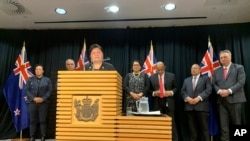New Zealand says it is “uncomfortable” using the 70-year-old “Five Eyes” intelligence grouping, which includes the United States, Britain, Australia and Canada, to criticize China. Some critics accuse the government in Wellington of selling out to Beijing..
The Five Eyes alliance was formed in 1941 to share secrets during World War II. Now, however, disagreements within the U.S.-led alliance are emerging about using the spy network to exert political pressure on China.
New Zealand, the group’s smallest member, has expressed reluctance to sign joint statements from its alliance partners condemning Beijing’s crackdown on the democracy movement in Hong Kong and its treatment of its minority Uyghur Muslim population in Xinjiang province. The declarations have infuriated China’s government.
New Zealand's foreign minister, Nanaia Mahuta, believes the Five Eyes alliance is not the best forum to voice those concerns.
“Can I say we do value the Five Eyes relationship. We receive a significant benefit from being a part of that relationship and they are close allies and friends in terms of common values and principles. But whether or not that framework needs to be invoked every time on every issue, especially in the human rights space, is something that we have expressed further views about,” said Mahuta,
However, critics, including some British lawmakers and influential newspapers, have accused the government in Wellington of selling “its soul to China.”
They accuse New Zealand, which earns about 29% of its export revenue from China, of choosing its economic ties with Beijing over a longstanding alliance with like-minded nations.
Media commentators in New Zealand have described the dilemma; speak out against China and suffer economic damage, as Australia has found, or stay silent and see the end of a “moral foreign policy” of which the nation was proud.
Australia experienced a decline in coal and wine exports to China due to tariffs and restrictions imposed by Beijing.
Alexey Muraviev, head of the Department of Social Sciences and Security Studies at Curtin University in the Australian city of Perth, believes divisions within the Five Eyes network will benefit China.
“When you see quarrels among long established and trusted allies, it gives China confidence that its policies divide and rule, its policies of effectively buying peoples’ and countries’ loyalties through major investment though special trade deals, through guaranteeing access to China’s tourists, China’s dollars, China’s market is working,” he said.
New Zealand is insisting the Five Eyes group remains vital for its border security, defense and cyber safety. It believes a broader coalition of countries is needed to address human rights concerns in China and elsewhere.
Analysts believe that divisions within the intelligence alliance show how the West is struggling to manage the economic and military rise of China.
Senior Australian and New Zealand government officials are due to meet next month to discuss the Five Eyes alliance, and other bilateral issues.




